10 big ideas: An ambitious agenda for our new leaders
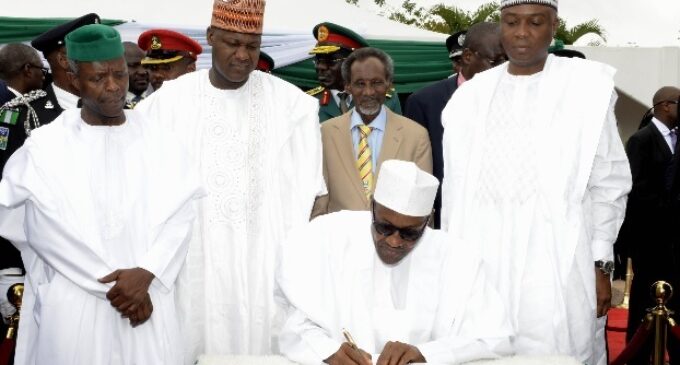
It’s early days yet, in the life of a new government. The voters have played their part by finally getting rid of a catastrophically inept and almost certainly corrupt president. It is now time for our new leaders to play theirs.
Political life is generally characterized by high hopes rapidly followed by crushing disappointment. And if this is to be our fate, then why not be disappointed by failure to achieve lofty goals? There’s honor in failing while tackling the impossible. Failing at small potatoes, on the other hand, is a destroyer of the soul.
Cliches are sometimes useful, so lets employ a few. Go big or go home. Shoot for the moon. Swing for the rafters. Or, as the impossibly ambitious motto of Modakeke High School declares, aut optimum at nihil: Either the best or nothing.
So, here are my 10 big ideas for the next 10 years:
1. FOUR LINES TO HEAVEN:
Build the four lines from which will rise a modern, wealthy country: gas lines, grid lines, fiber lines and rail lines.
We have gas fields holding deposits that are pretty much inexhaustible for our domestic purposes for the next several generations. Pipe it across the country from the coast, to fuel new power plants. I will not go so far as to say forget about coal and hydro and solar and wind— those are useful too, but with the exception of coal, are largely boutique operations, at least for our immediate needs. Those should be pursued by local authorities for the purpose of plugging gaps in the system. Gas is cheap; gas is environmentally better than coal, and we have enough of it to power the whole of West Africa, of which more later.
And then we need a new grid. The other big gap in our plans to generate and deliver enough power to the economy is an antiquated grid that currently can’t carry adequate power where it’s needed— even if we manage to generate what we need.
Layered on top of that grid should be a dense fiber optic network, delivering blisteringly fast connectivity— the lifeblood of the modern economy— to all parts of the country. Let’s make bandwidth a commodity— a cheap, ubiquitous commodity— and set the people free. It removes one big obstacle to unleashing the ingenuity of our young population. We have no telecoms legacy. We leapt straight to digital mobile from almost no fixed lines. We oldies won’t necessarily know what to do, but the youngsters know, believe me. Free them. Let freedom ring. From the towering plateaus of Adamawa to the mangrove swamps of the Delta, let freedom ring.
And finally possibly the most important of the Four Lines— a railroad network built substantially from scratch. Hire a rail czar. Set a big objective for our country to build 10,000 kilometers of railroad over the next 10 years. We have enough financial engineers to figure out how to pay for it. We need real engineers to build it. Let’s not be stupid. Let’s go find them wherever on the blessed planet they happen to be. Put hundreds of thousands of Nigerians to work laying steel and wood and clearing forests and surmounting ravines. Work 24 hours a day with three-shift crews. Measure progress daily, weekly, monthly and yearly. Let the whole country collaborate, for a change, in building something substantial together.
Start work crews in Maiduguri and Calabar and Lagos and Sokoto. More than 100 years ago the Sultan pleaded with the Brits to bypass Sokoto as the old colonial rail line sneaked up from the coast, fearful that it would bring unwelcome modernity and rank degenerates to his domain. The result is that the line terminated at Kaura Namoda. Sokoto became a backwater, largely economically isolated and subsequently it withered on the vine. Cities such as Kano and Maiduguri, plus the upstart Kaduna, soon surpassed Sokoto in importance. Today Sokoto has a few baobabs and a Sultan. Who cares about baobabs and Sultans? Set the people free. Give them a chance to make a living and educate their children. Bring a new express train to Sokoto (and to Mambilla Plateau and my good old hometown of Modakeke.) Connect the whole of our country. Move people and goods cheaply and safely. Put the people to work. 10,000 kilometers in 10 years. Go big. Do something useful. Don’t be a stupid politician. Be a builder. Lead.
2. DIGITAL NATION
When Kennedy saw the Russians send the Sputnik into space, the young president boldly announced that America was going to put man on the moon within a decade. Was he absolutely certain this was achievable? No. Instead, he knew he led a country with a can-do spirit, and if you set the goal large enough and impossible enough, the humans of America (of that time) would find a way to achieve it. Within 7 years of the speech, Neil Armstrong took ‘one small step for man; a giant leap for mankind.’
So how about this relatively modest proposal? President Buhari should go out on a limb and announce that every Nigerian man, woman and child, in every village and every hamlet, in every town and every city, will be biometrically identifiable in a giant data base within the next four years. He should then hire the people, and recruit the allies and collaborators, to deliver this biometric national ID card to every Nigerian. The Indians are attempting it right now. But we are better than the Indians! We are better, certainly, than the retrograde Americans and Europeans and can leapfrog every nation to establish without a doubt who we are, how many we are, where we live, what our ages are, what we do, and thus unlock the door to progress.
A national biometric ID for every 180 million of us changes everything. Put simply, it means we are no longer flying blind. It means we know for sure how many children will enter the school system next year and the year after. It means we can measure. This is the biggest of all Big Data. We will know how many have prostate cancer or live in the cities or till the soil or work in the government. It will mean the end of ghost workers and ghost hospitals. My friends in Kaduna, racing at warp speed to rescue their state, just recently discovered entire ghost schools, complete with ghost principals and teachers, but somehow earning cold hard cash. It may be true that there’s no magic bullet on earth, but this is as close as you are going to get to one.
Impact on the banking system and availability of credit? Immeasurable. Crime prevention and control? Planning for public housing or mass transit or public health? Government transparency? Election integrity? Please, people. This is a no-brainer. Sure there are potential downsides, especially around privacy. But we are smart enough to figure out how to mitigate that. See clearly what is before you. We can have at least 99% of Nigerians biometrically identified by the time the next election rolls around. And that is in less than four years.
Impossible, you say? Wrong. Do the math. We are approximately 180 million people (we will know for sure after this exercise.) The electoral commission already can positively identify around 80 million of us. The banks have another 50 million or so, from the recent mandatory account verification exercise. Much of the sprawling federal civil service also has, what, another 3 or four million? Then you have the inept national ID agency, which has managed to issue fewer than 10 million over the past 30 years. (The agency officials recently rushed to the president’s office to issue him his very own ID, completely missing the irony.)
If you put it all together, that’s roughly 150 million instances of positive identification. Now let us assume there is significant overlap, say of 50 million, right now, today, you already have 100 million Nigerians you can positively identify, without a shadow of doubt. You just didn’t know you could. Integrate all these databases. Then over the next four years use the law to roll in those outside the system. Every school enrollment, every attempt to register a business or buy an air ticket or get on an Ekene Dili Chukwu bus, or check into a hotel or a hospital, or receive fertilizer from agric support workers, or obtain a loan or drive a motor vehicle— all will require a national ID. You may not even need four years to cover 99% of your population. Recruit Google as a collaborator if you must. Or Microsoft. Or my friends toiling diligently in the fields all over India. Don’t stand guilty of pusillanimity. Kennedy put man on the moon, but only after he was already dead. This you can do in your lifetimes. Act now. Don’t be a disgrace to coming generations of African people.
To deploy another useful cliche, this is a GAME CHANGER.
3. TURBOCHARGE THE ECONOMY
The president and his new cabinet (where is the economic team??) should set a target of achieving a per capita GDP of $10,000 over the next 25 years— or 10% GDP growth per year for the next 25 years. Think about it; if you did this, no one could ever accuse you, ever again, of being low-life, dissembling, unambitious politicians. This is the big one, people. Clear goals concentrate the mind, and extended concentration yields solutions. Figure it out. Faithfully implementing ‘Four Lines To Heaven’ (Big Idea #1) is guaranteed to get you there.
Don’t be afraid to go out on a limb. We need this more than anything, because here, my fellow citizens, we are talking about lifting 100 million people out of absolute poverty. We all know, or should know, that poverty is man-made, and so is wealth. Read Karl Popper. But read Armatya Sen too. Assemble the people who can get this done, whether Nigerian or not. Do not mistake the means for the end. Poverty is a crime against humanity. Each day that extreme poverty is not being single-mindedly eliminated from the beloved country is each day that our leaders are committing a crime. Come on, people. Are we not now Nigerians? Do we lack the balls to solve gigantic problems? Stealing oil money is cheap. Giving a child a chance to grow to his fullest potential, now that is a job for real men (and many more real women.)
4. DUMP OIL
Get out of the oil business, now. The government, for our purposes and in recognition of our circumstances, should get the hell out of oil. The cheap money has poisoned us. Perspective has been lost, though not irretrievably. There are stories of $700m in cash being found in the home of the former oil minister. Credible allegations abound of billions of dollars stolen, perhaps as much as $150 billion over the last 10 years from the oil sector alone. We have enough wealth to go round if only we have some bold leaders. We wouldn’t need Save The Children to deliver mosquito nets to our villages because we can already afford it— if we don’t steal the money first.
Here is my logic: oil is a commodity, like wheat, or groundnuts or rice or tanzanite. Why is the government not in the bread business? Or the tanzanite business? Or the orange juice business? Or the pork bellies business? There is nothing special about oil! Apple is not in the oil business, and Apple has cash reserves of $150 billion. Nigeria, in totality, has cash reserves of about $40 billion. Wake up! Oil is killing you. Get out while you still can. Spin off the national oil company, the NNPC, and list it in London. Force it to follow the rules. London is admittedly crooked, but not quite as crooked as Abuja and Port Harcourt. Sell off your other joint venture assets via auction. That includes your half of NLNG, the giant gas concern, which alone gives you some $40 billion in cash. Roll the cash into implementing ‘Four Lines To Heaven.’ Read Ibn Khaldoun’s ‘The Muqaddimah.’ Heed my words, O King. Tax the oil company. And you don’t need to tax them any more than they are taxed in various countries, including what the US government calls the ‘windfall tax,’ for when the oil gusher is really pumping cash. Tax the sector as any other business. You will attract more investment and your tax revenues will leap. You will make more money than you are doing now, and also, just as important, you will drain the swamp.
Crooked people always end up being in charge no matter what you do. The cash is too free, too large, and too tempting. Under it’s influence, even good people don’t remain good for long. Shut down that pipe.
This takes real courage to do, Mr. President, because it goes against your own instinct and experience from 40 years ago. It also is difficult because all your allies will be whispering in your ears, sounding all sweet and reasonable, using such stock phrases as “national interest,” “commanding heights” of the economy, “local control,” “national destiny,” “strategic sector.” You may safely dismiss all of this nonsense. These are people who by and large are thinking ‘It’s Our Turn To Eat,’ to borrow the title of John Githongo’s book about political corruption in Kenya. Oil by itself alone means nothing to us, Mr. President. It is not the end that we seek, only one means of getting there. Our objective is to have the resources to build our citizens, real citizens, so that they in turn can build a real country. Our objective is not to control oil, but to generate the revenue from that and numerous other sources so we can accelerate the efforts to modernize our country. Oil is no more important than roasted plantain; you just make more money from it more quickly. Be a regulator. Be a very good (and wise) regulator. Do not be a regulator and an operator at the same time. No matter your good intentions, you will never be able to rise above that inherent contradiction. Again, I implore you to read Ibn Khaldoun. I am happy to send you a copy.
5. RETURN TO LOCAL POLICE
Let’s state this very clearly: it is insane to centralize ALL policing functions. How do you fight burglary, rape, noise, sanitation violation, illegal occupation, traffic violation, pickpockets and neighborhood gangs, from a command and control center in the federal capital?
Policing is a local function. It belongs at the local level, just as most of its duties at the moment are actually constitutionally allocated to local authorities. Burglary is not a federal function. Nor is trespassing. Let us, carefully but not ponderously slowly, return most policing functions to state governments. The best and cleanest way to do this, perhaps, is simply to dissolve the current Nigerian Police department, and send its various components to the states where they are already deployed. The government of a state should have law enforcement capabilities (in addition to taxation responsibilities), without which it cannot be properly called a government. In colonial times and the first five years or so of independence, policing functions resided almost entirely at the local level. Our history of military coups has centralized everything and debased the system.
Some will argue that this might be too volatile, that we have too many demented state governors and sundry potentates, and they will simply use police to repress their opponents. I say, perhaps. But we are not without means. First, let’s run a pilot in two obvious territories, Lagos and Abuja, maybe Kaduna too. Vest policing functions fully in the respective governments. Lets see how things work out over three years, then set another five years to slowly transfer the police apparatus to the remaining state governments, based on a readiness certification by the attorney general. Second, let the center legally retain claw-back powers in cases of egregious abuse. In other words, upon the certification of the attorney general, the federal government can legally (re)assume direct control of the police in a particular state where extraordinary abuse of police powers has been established. You could also subject the attorney general’s certification to a validation by a federal appeals court panel, to prevent potential abuse even by the attorney general. Some may recall that, at the height of the civil rights movement in 1960s United States, the attorney general (Robert Kennedy) ‘federalized’ the national guards (normally under control of the state governor) when some governors in the south (Alabama, Mississippi, Georgia, among others) openly disobeyed court rulings to let black students attend university with whites. One of the more famous pictures from the era is of my sister Charlayne Hunter-Gault, the longtime New York Times, CNN, and New Yorker Magazine correspondent, who can be seen in those old black and white photos being escorted to class by federalized guards at the University of Georgia :Dignified, beautiful African woman braving the feral dogs of white supremacy.
What we need is nothing less than a complete refurbishment of the state, so that it can work for the ordinary citizen. We can do this. Or else we can tell the same old stories of impotence to our grandchildren in 10 years time.
6. SCRAP ‘FEDERAL CHARACTER’
I bet many people are just finding out for the first time, as the new cabinet is slowly assembled, that the constitution requires the president to choose at least one cabinet minister from each of the 36 states of the federation.
Each time I reflect upon this, I have new respect for the many talents of my country for self-injury. Naturally, Nigerian politicians, fashioned from the same crooked stick as politicians everywhere, have taken full advantage of this to name unwieldy cabinets the size of all soccer players in the English Premier League combined. A number of years ago I was part of a team from the Aspen Institute that presided over a two-day leadership seminar for President Olusegun Obasanjo’s second term cabinet. My friend Nasir El-Rufai, then minister of the federal capital and now governor of Kaduna State, had asked us to do it. Now a typical Aspen leadership seminar is designed as a Socratic dialogue among 20-25 people sitting at a round table as if at Plato’s Academy in Athens, with ideas bouncing back and forth like a ping pong— “a dialogue, not a monologue,” as my old friend Keith Berwick is fond of saying. But Obasanjo showed up with 76 cabinet and cabinet-level officers in an auditorium, with himself at the high table, pontificating for two long days. Clearly a cabinet of 76 is no cabinet at all.
Let us do the sensible thing and slash the cabinet to no more that 18 ministers. We should of course remove the offending constitutional provision but, this being a cumbersome process, we can in the meantime declare many key departments as cabinet-level agencies without in reality being actually part of the cabinet, as a workaround. The cabinet should be built for deliberation and for setting priorities in the executive branch. It should not be a bazaar of dozens of people meeting once a week for the purpose, as it has been thus far, of ratifying contracts and preening for the presidential affection. The old western region, roughly one-quarter of the country, was run by 12 ministers and a premier, and they delivered free education and built probably the most egalitarian corner of our country. Now we have a central government with high officials and ‘honorables’ coming out the wazoo, and 36 state governments with hundreds and thousands of ‘big man’ officials complete with police outriders and flashing blue lights and wailing sirens, the best to impress the wretched multitudes.
Can we just calm down and dramatically shrink everything? Look for the smartest people, and let them run things, without caring too much whether they speak Igbo or come from the savannah. Geography is not destiny. Keep the goal clearly in front of you. Are you trying to educate children? Does it matter if the math teacher is from Ghana? Are you trying to fly a plane from Calabar to Kano? Does it matter if the pilot is from Kafanchan? Is the Central Bank governor highly competent and of sound mind and character? Does it matter if he is Kanuri?
We shouldn’t even have to be discussing this, but here we are, a benighted and slightly deranged people trying mightily now (I hope) to get themselves together. About four years or so ago my wife and I were invited to the carnival in Rio. Our hosts threw a nice lunch party at their splendid apartment overlooking Ipanema beach. One of the guests was the Brazilian Central Bank governor. He was not Brazilian. Gov. El-Rufai has a couple of Yoruba guys among his senior aides. He’s been under attack ever since for selling the “indigenes” short.
In principle it is preferable to create the perception and, where possible, the reality of having people from all parts of our country participating in all spheres of national life. But this should be a politically enforceable proposition, not a legally mandated one. The first question always should be, is the person the best available for the job? Luckily for us this is not hard at all. We have talent from every nook and every cranny of the beloved country— and millions more in the Diaspora creating a huge pool of talent. The US Census bureau reports that Nigerian-born or Nigerian descended people in the United States are the best educated group in the country, producing per capita people with more bachelor and graduate degrees, including PhDs. We have no shortage of talent if we care to look for it. The problem is that many people, not having the requisite diversified social networks, make too little effort to seek such talent. A lot of people from southern Nigeria, especially the Lagos crowd, are guilty of this myopia. Seek, and ye shall find. Several years ago when we were trying to build the leadership as well as other staff of NEXT newspaper, Amma and I were determined to have many women running things, in addition to having editors and reporters from all parts of the country and of all backgrounds, familial and academic. We achieved something around 40 percent women, including the editor of the paper, who also happened to be a Fulani woman from Kano. We did not have to sweat too much to get her. We had a network of friends who naturally suggested candidates who were from all over. In this particular case, thank you, William Wallis, for bringing Kadaria Ahmed to our attention.
7. SET THE PEOPLE FREE
Eliminate all visa or residency requirements for all ECOWAS citizens. Allow a completely free flow of people and goods in our West Africa region. A potential megalopolis of hundreds of millions of people is already responding to the gravitational pull of Lagos along the coast as far west as Abidjan. Make it a reality. Be bold. If you are a little queasy in the stomach try this for three years initially and see what tweaks are required. Then go hell for leather and remove these artificial and ruinous border posts. Create a single ECOWAS market. You don’t necessarily need to create a single Eco currency. The Nigerian naira, backed by Africa’s largest economy, will be the de facto exchange instrument anyhow (while preserving the authority of local central banks to respond to exceptional situations, something that could have saved Greece.) While you are at it, begin construction of a Dakar to Douala coastal railway.
You might want to consider going even bigger. Offer citizenship to all Diaspora Africans, particularly targeting African Americans, at least those who would like to have it. Dual citizenship is legal in America and Nigeria. Use it. You will have a powerful constituency in the world’s most powerful country. You will have a steady inflow of talented and entrepreneurial people. Grant them the 40 acres and a mule, even if only metaphorically. They are descended from these parts anyway, so what right do we have to deny them their birthright? Besides, with such a natural constituency, it would be hard for the US government to screw with you. Think Israel. Play smart. It’s a win-win.
8. THIS LAND IS MY LAND (REALLY)
Account for every square centimeter of land in the entire territory of the federal republic. Issue certificates of occupancy to all identifiable land owners. End the vagueness of communally held land and its capacity to generate endless dispute and violence. Where a community, rather than an individual or corporate body, does historically lay claim to the land, create trusts to legally hold the property. A nationwide electronic geographic information system will do more than end violent disputes and endless court cases; it puts money in people’s pockets by making land easily fungible. My father’s house in Modakeke is worth almost nothing because there is no legal title to it. So is my friend Nosa Igiebor’s 1,000-hectare family land in Benin. Read or reread Hernando DeSoto’s ‘Mystery of Capital.’ It was relevant yesterday; it is even more so today. Don’t make a mockery of most families’ principal asset when this can be turned into wealth. It is relatively easily done. My friend Nasir El-Rufai accomplished this in Abuja, when he was federal minister of the Federal Capital territory from 2003-2007. Now that he is governor of Kaduna State, he’s planning to do the same thing. Land is a state issue, so the federal government can nudge the laggards in the right direction by creating a fund to underwrite electronic land registration for any state that needs help. Stop manufacturing mass poverty and do the right thing.
9. NEITHER HONORABLE NOR EXCELLENT BEFORE THE FACT
Please, tone down the big man show. It has worn thin. You don’t need a 10-car convoy to move around, accompanied by a thousand police officers. You can fly economy domestically and your spouse will still love you. Carry your own bag. You don’t need to jump the queue at the airport. Stop calling yourselves honorable or excellency. Let us judge, at the end of your tenure, whether you have been excellent or honorable. Bring more young people into the highest reaches of government. The rest of the world knows that your best trained people aged 35-45 are in the sweet spot for maximum productivity. I am older than Barack Obama and David Cameron and Matteo Renzi. Stop this ageist nonsense, my fellow golden oldies. We need high energy and creativity and an instinctive feel for how today’s world works. Our smart young talent, given massive responsibilities right now, will be in a position to run the whole thing in four years’ time.
10. FOCUS ON SYSTEMICALLY IMPORTANT ISSUES
It is far more rewarding than dissipating energy on the small stuff. It doesn’t take you away from fighting corruption or securing the citizen against the scourge of casual violence, or fixing schools or stocking the village dispensary. You can walk and talk at the same time. I was going to say you can talk and chew gum at the same time, but Dr Joe Abbah objected once on the basis that that it might not present a pretty picture (he may have used the word ‘disgusting.’). We have the outlines of a cabinet now. On the surface it doesn’t look like the world’s strongest cabinet but there are enough ponies in there to start galvanizing the country in a certain exciting direction. There are talented men and women in there. Let’s seek perfection by all means, but progress is nothing to be sniffed at either. I can’t believe that I find myself quoting Donald Rumsfeld, but it is true that you go to war with the army you’ve got. Make this moment count. Get to work, my friends. Lead wisely and well, and we will follow.
Also, try to have dinner most nights with your family and stop lurching from one political meeting to the other at all hours of night and day. Leave room for slow thinking on an early morning walk. Read for fun. Learn to play golf. Be exemplary citizens and we will take our cue from you.
Views expressed by contributors are strictly personal and not of TheCable.


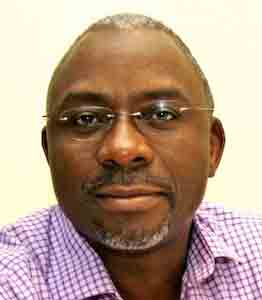






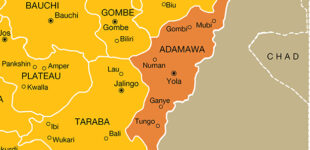
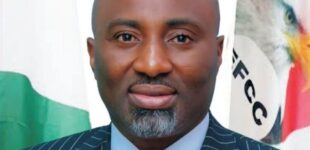
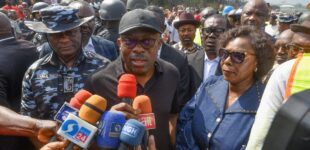



Wake me up after you have successfully changed our Constitution
Great. Really inspiring .
What an inspiration! Kudos to the writer. Hey! I have the 11th idea, of course inspired by the first 10 ideas in this article. I don’t believe we can get these ideas implemented by the current actors. They just cannot pull it off. If they could we wouldn’t have been in this mess. Here’s the 11th idea: Let everyone that really believes in these bold and ambitious ideas join hands, virtually, to form a new political party. These 10 ideas become the manifesto. Nigerians all over the globe are welcome. It will be a winning alternative to the status quo. We can call the new party The Great Nigeria Party, or any other inspiring name. We vow to work to achieve this. If a million people buy in from around the world, and contribute to a designated bank account, an initial minimum of 1000 Naira each, we’ll have a whopping 1 billion Naira to start the movement. Imagine that! Personally, I’m in. Are you? I ask all well-meaning Nigerians from anywhere on the planet to join me. Of course these ideas are open to modifications by consensus. Let’s do it!